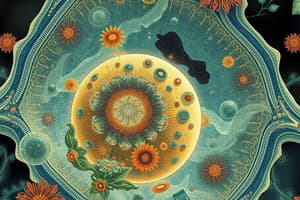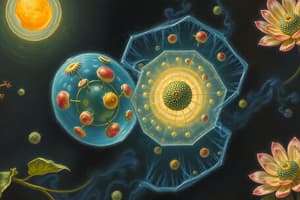Podcast
Questions and Answers
What process is essential for organisms to release energy from glucose?
What process is essential for organisms to release energy from glucose?
- Photosynthesis
- Protein Synthesis
- DNA Replication
- Cellular Respiration (correct)
Which term describes the variety of genes within a species?
Which term describes the variety of genes within a species?
- Genetic diversity (correct)
- Ecosystem diversity
- Population density
- Species diversity
What is one major threat to biodiversity caused by human activities?
What is one major threat to biodiversity caused by human activities?
- Genetic drift
- Natural selection
- Habitat destruction (correct)
- Ecological succession
What process ensures genetic continuity during cell division?
What process ensures genetic continuity during cell division?
Which component of the scientific method involves making predictions based on observations?
Which component of the scientific method involves making predictions based on observations?
What is the primary focus of cell theory?
What is the primary focus of cell theory?
Which principle explains how organisms maintain a stable internal environment?
Which principle explains how organisms maintain a stable internal environment?
What is metabolism primarily involved in?
What is metabolism primarily involved in?
What does heredity govern in living organisms?
What does heredity govern in living organisms?
Which branch of biology focuses on the interactions between organisms and their environment?
Which branch of biology focuses on the interactions between organisms and their environment?
Which branch of biology is primarily concerned with the structure and function of living organisms at a molecular level?
Which branch of biology is primarily concerned with the structure and function of living organisms at a molecular level?
Which concept describes species changing over time due to natural selection?
Which concept describes species changing over time due to natural selection?
What study focuses specifically on microorganisms such as bacteria and viruses?
What study focuses specifically on microorganisms such as bacteria and viruses?
Flashcards
What is Biology?
What is Biology?
The scientific study of life, encompassing all living organisms from the smallest bacteria to complex mammals. Its focus is on understanding the structure, function, development, distribution, and origin of life.
Cell Theory
Cell Theory
The theory stating that all living organisms are made up of basic units called cells, which carry out essential life functions.
What is Homeostasis?
What is Homeostasis?
The ability of an organism to maintain a stable internal environment despite changes in its external surroundings.
What is Metabolism?
What is Metabolism?
Signup and view all the flashcards
What is Heredity?
What is Heredity?
Signup and view all the flashcards
What is Evolution?
What is Evolution?
Signup and view all the flashcards
What is Botany?
What is Botany?
Signup and view all the flashcards
What is Zoology?
What is Zoology?
Signup and view all the flashcards
Photosynthesis
Photosynthesis
Signup and view all the flashcards
Cellular Respiration
Cellular Respiration
Signup and view all the flashcards
DNA Replication
DNA Replication
Signup and view all the flashcards
Species diversity
Species diversity
Signup and view all the flashcards
Genetic diversity
Genetic diversity
Signup and view all the flashcards
Study Notes
Introduction to Biology
- Biology is the scientific study of life, encompassing a vast range of organisms, from microscopic bacteria to complex mammals.
- Key themes in biology include evolution, genetics, ecology, and physiology.
- It seeks to understand the structure, function, development, distribution, and origin of life.
Fundamental Principles of Biology
- Cell Theory: All living organisms are composed of cells, the basic units of life. Cells carry out the functions necessary for life through complex molecular processes.
- Homeostasis: Organisms maintain a stable internal environment despite changes in their external surroundings. This internal regulation is crucial for survival.
- Metabolism: The sum of all chemical reactions occurring within an organism is known as metabolism. These reactions allow organisms to acquire energy, grow, and reproduce.
- Heredity: The transmission of traits from parent to offspring is governed by genetics, involving DNA and genes.
- Evolution: Species change over time through a process called evolution, driven by natural selection. Variation among individuals within a species is essential for this process. Genetic mutations play a role in generating new traits.
Branches of Biology
- Botany: The study of plants, including their structure, function, reproduction, and evolution.
- Zoology: The study of animals, focusing on their diversity, behavior, physiology, and evolution.
- Genetics: The study of genes, heredity, and variation in organisms. This includes the mechanisms of gene expression and inheritance.
- Ecology: The study of the interactions between organisms and their environment. This field explores ecosystems and the relationships within them.
- Microbiology: The study of microorganisms, including bacteria, viruses, fungi, and protists.
- Physiology: The study of the functions of living organisms and their parts. This includes cellular, organ, and organism-level function.
- Molecular Biology: Examines the structure and function of biological macromolecules like proteins and DNA, exploring the molecular mechanisms underlying life processes.
- Biochemistry: This branch focuses on chemical processes occurring within living organisms. It overlaps heavily with molecular biology, but also considers broad metabolic pathways and cellular functions.
Key Biological Concepts
- Photosynthesis: The process by which green plants and some other organisms use sunlight to synthesize foods from carbon dioxide and water. A crucial energy-producing process for the biosphere.
- Cellular Respiration: The process by which organisms break down glucose to release energy in the form of ATP. This is essential for powering cellular activities.
- DNA Replication: The process by which DNA copies itself during cell division, ensuring genetic continuity. Errors in DNA replication can lead to mutations.
- Protein Synthesis: The process where cells use DNA information to make proteins, which are crucial for virtually every aspect of cellular function and structure.
- The Scientific Method: Biology, like other sciences, uses the scientific method to formulate hypotheses, design experiments, and draw conclusions based on evidence. This approach is fundamental to advancing biological knowledge.
Biodiversity
- Species diversity: The variety of different species in a particular ecosystem or region.
- Genetic diversity: The variety of genes within a species. This diversity is important for adaptation and resilience to environmental change.
- Ecosystem diversity: The variety of different habitats and ecological communities in a particular region.
- Threats to biodiversity: Human activities, such as habitat destruction, pollution, and climate change, are major threats to biodiversity worldwide. Understanding and mitigating these threats is crucial for conservation efforts.
Studying That Suits You
Use AI to generate personalized quizzes and flashcards to suit your learning preferences.




